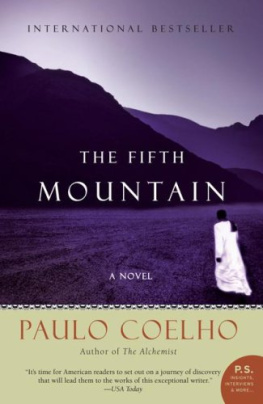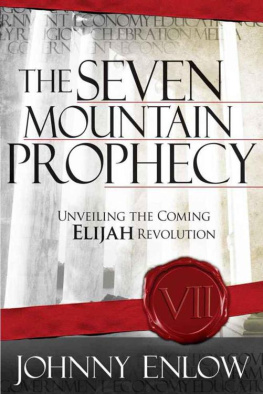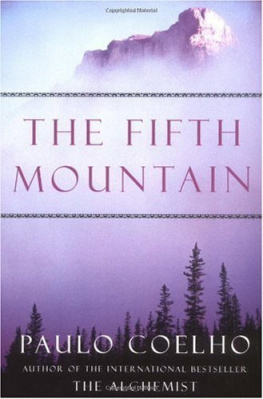Publisher: HarperFlamingo
Publisher: HarperCollins Publishers
Date: 2009
ISBN13: 9780061729256
* * * * * *
The Fifth Mountain Coelho, Paulo
At the beginning of the year 870 B.C., a nation known asPhoenicia, which the Israelites called Lebanon, had marked almost threecenturies of peace. Its inhabitants could take pride in theiraccomplishments; because they were not politically powerful, they haddeveloped an enviable skill at negotiation as the only means ofassuring survival in a world beset by constant war. An alliance madearound the year 1000 B.C.with King Solomon of Israel had allowed the modernization of itsmerchant fleet and the expansion of trade. Since that time, Phoeniciahad never stopped growing.
Its navigators had traveled to places asdistant as Spain and the Atlantic Ocean, and there aretheoriesas yet unconfirmedof their having leftinscriptions in northeastern and southern Brazil. They carried glass,cedar, weapons, iron, and ivory. The inhabitants of the large citiessuch as Sidon, Tyre, and Byblos were familiar with numbers,astronomical calculations, the manufacture of wine, and for almost twohundred years had been using a set of characters for writing, which theGreeks knew as alphabet.
At the beginning of the year 870 B.C., a council of warwas meeting in a distant place called Nineveh. A group of Assyriangenerals had decided to send troops to conquer the nations locatedalong the Mediterranean coast. Phoenicia had been selected as the firstcountry to be invaded.
At the beginning of the year 870 B.C., two men hiding in astable in Gilead, in Israel, expected to die in the next few hours.
I HAVESERVED A LORDWHO NOW ABANDONS ME INTO the hands of myenemies, said Elijah.
God is God, the Levitereplied. He did not tell Moses whether He was good or evil;He simply said: I am. Heis everything that exists under the sunthe lightning boltthat destroys a house, and the hand of man that rebuilds it.
Talking was the only way to ward off fear;at any moment, soldiers would open the door to the stable where theywere hiding, discover them both, and offer the only choice possible:worship Baal, the Phoenician god, or be executed. They were searchinghouse by house, converting the prophets or executing them.
Perhaps the Levite would convert and escapedeath. But for Elijah there was no choice: everything was happeningthrough his own fault, and Jezebel wanted his head under allcircumstances.
It was an angel of the Lord whoobliged me to speak to King Ahab and warn him that it would not rain solong as Baal was worshiped in Israel, he said, almost in aplea for absolution for having heeded what the angel had told him.But God acts slowly; when the drought begins to take hold,Princess Jezebel will already have destroyed all who remain loyal tothe Lord.
The Levite said nothing. He was reflectingon whether he should convert to Baal or die in the name of the Lord.
Who is God? Elijahcontinued. Is it He who holds the sword of the soldier, thesword that executes those who will not betray the faith of ourpatriarchs? Was it He who placed a foreign princess on ourcountrys throne, so that all this misfortune could befallour generation? Does God kill the faithful, the innocent, those whofollow the law of Moses?
The Levite made his decision: he preferredto die. Then he began to laugh, for the idea of death frightened him nolonger. He turned to the young prophet beside him and attempted to calmhim. Ask God, since you doubt His decisions, hesaid. I have accepted my fate.
The Lord cannot wish us to bemassacred without mercy, insisted Elijah.
The Fifth Mountain
God is all-powerful. If Helimited Himself to doing only...
If He is all-powerful, whydoesnt He spare the suffering of those who love Him? Whydoesnt He save them, instead of giving might and glory toHis enemies?
I dontknow, said the Levite. But a reason exists, and Ihope to learn it soon.
You have no answer to thisquestion.
No.
The two men fell silent. Elijah felt a coldsweat.
You are terrified, but I havealready accepted my fate, the Levite said. I amgoing out, to bring an end to this agony. Each time I hear a scream outthere, I suffer, imagining how it will be when my time comes. Sinceweve been locked in here, I have died a hundredfold, while Icould have died just once. If I am to be beheaded, let it be as quicklyas possible.
He was right. Elijah had heard the samescreams, and he had suffered beyond his ability to withstand.
Im going with you. Iweary of fighting for a few more hours of life.
He rose and opened the stable door, allowingthe sun to enter and expose the two men hiding there.
THELEVITEtook him by the arm, and they began to walk. If not for one thenanother scream, it would have seemed a normal day in a city like anyothera sun that barely tingled the skin, the breeze comingfrom a distant ocean to moderate the temperature, the dusty streets,the houses built of a mixture of clay and straw.
The Fifth Mountain
Our souls are prisoners of theterror of death, and the...
I admire your faith.
The Levite looked at the sky, as ifreflecting briefly. Then he turned to Elijah. Do not admire,and do not believe so much; it was a wager I made with myself. Iwagered that God exists.
Youre aprophet, answered Elijah. You too hear voices andknow that there is a world beyond this world.
It could be myimagination.
You have seen Godssigns, Elijah insisted, beginning to feel anxiety at hiscompanions words.
It could be myimagination, was again the answer. In actuality,the only concrete thing I have is my wager: I have told myself thateverything comes from the Most High.
THESTREET was deserted. Inside their houses, thepeople waited for Ahabs soldiers to complete the task thatthe foreign princess had demanded: executing the prophets of Israel.Elijah walked beside the Levite, feeling that behind each door andwindow was someone watching himand blaming him for what hadhappened.
I did not ask to be a prophet.Perhaps everything is merely the fruit of my ownimagination, thought Elijah.
But, after what had occurred in thecarpenters shop, he knew it was not.
SINCECHILDHOOD, he had heard voices and spokenwith angels. This was when he had been impelled by his father andmother to seek out a priest of Israel who, after asking many questions,identified Elijah as a nabi,a prophet, a man of the spirit, one whoexalts himself with the word of God.
After speaking with him for many hours, thepriest told his father and mother that whatever the boy might uttershould be regarded as earnest.
When they left that place, his father andmother demanded that Elijah never tell anyone what he saw and heard; tobe a prophet meant having ties to the government, and that was alwaysdangerous.
In any case, Elijah had never heard anythingthat might interest priests or kings. He spoke only with his guardianangel and heard only advice about his own life; from time to time hehad visions he could not understanddistant seas, mountainspopulated with strange beings, wheels with wings and eyes. As soon asthe visions disappeared, heobedient to his father andmothermade every effort to forget them as rapidly aspossible.
For this reason, the voices and visionsbecame more and more infrequent. His father and mother were pleased,and they did not raise the matter again. When he came of an age tosustain himself, they lent him money to open a small carpentry shop.
NOWAND AGAIN, he would gaze respectfully uponthe other prophets, who walked the streets of Gilead wearing theircustomary cloaks of skins and sashes of leather and saying that theLord had singled them out to guide the Chosen People. Truly, such wasnot his destiny; never would he be capable of evoking a trance throughdancing or self-flagellation, a common practice among thoseexalted by the voice of God, because he wasafraid of pain. Nor would he ever walk the streets of Gilead, proudlydisplaying the scars from injuries achieved during a state of ecstasy,for he was too shy.
















